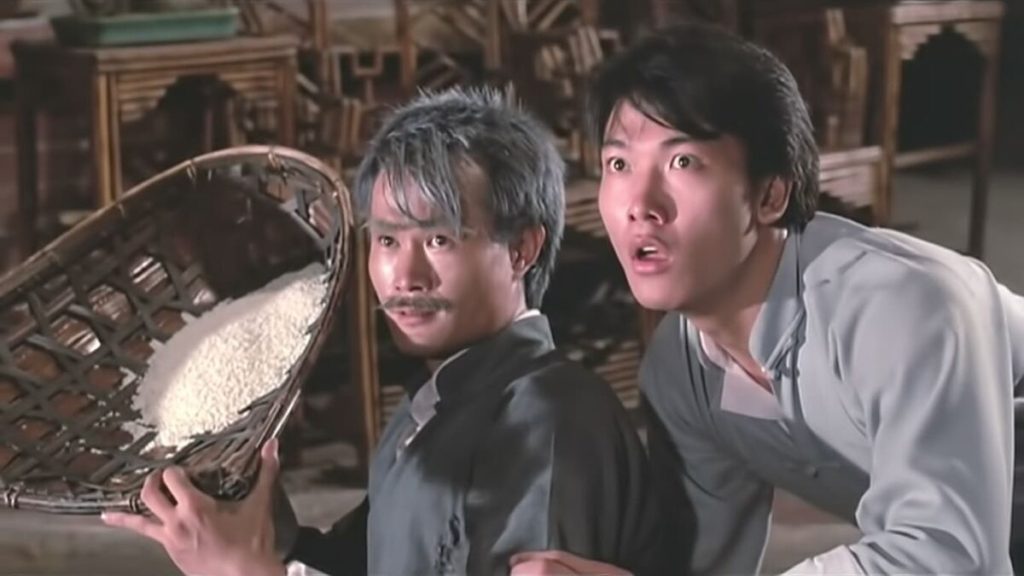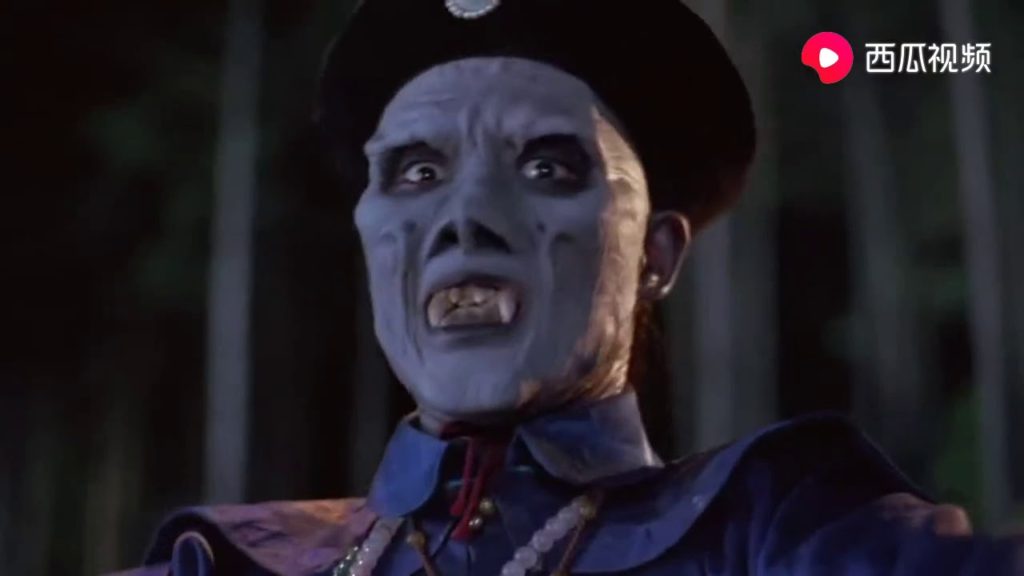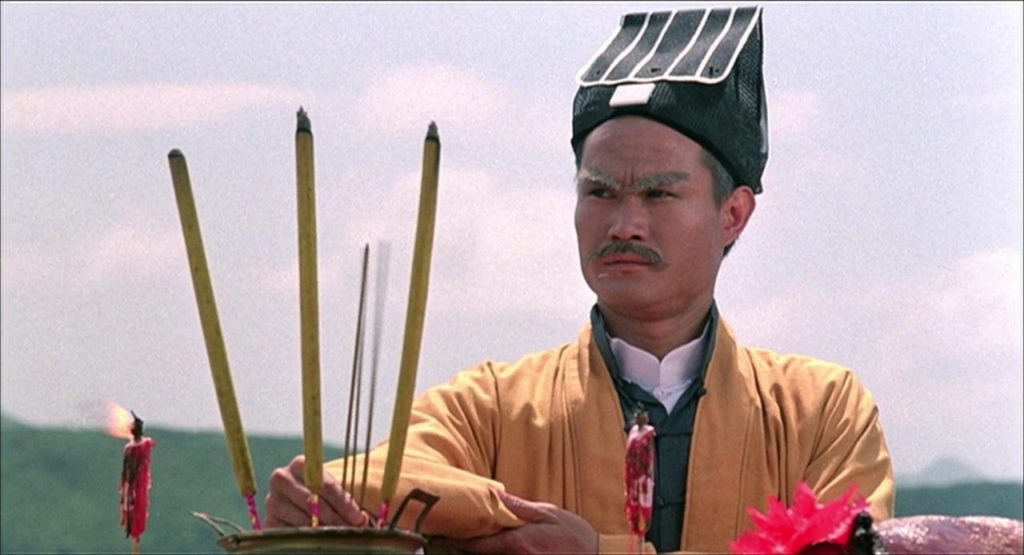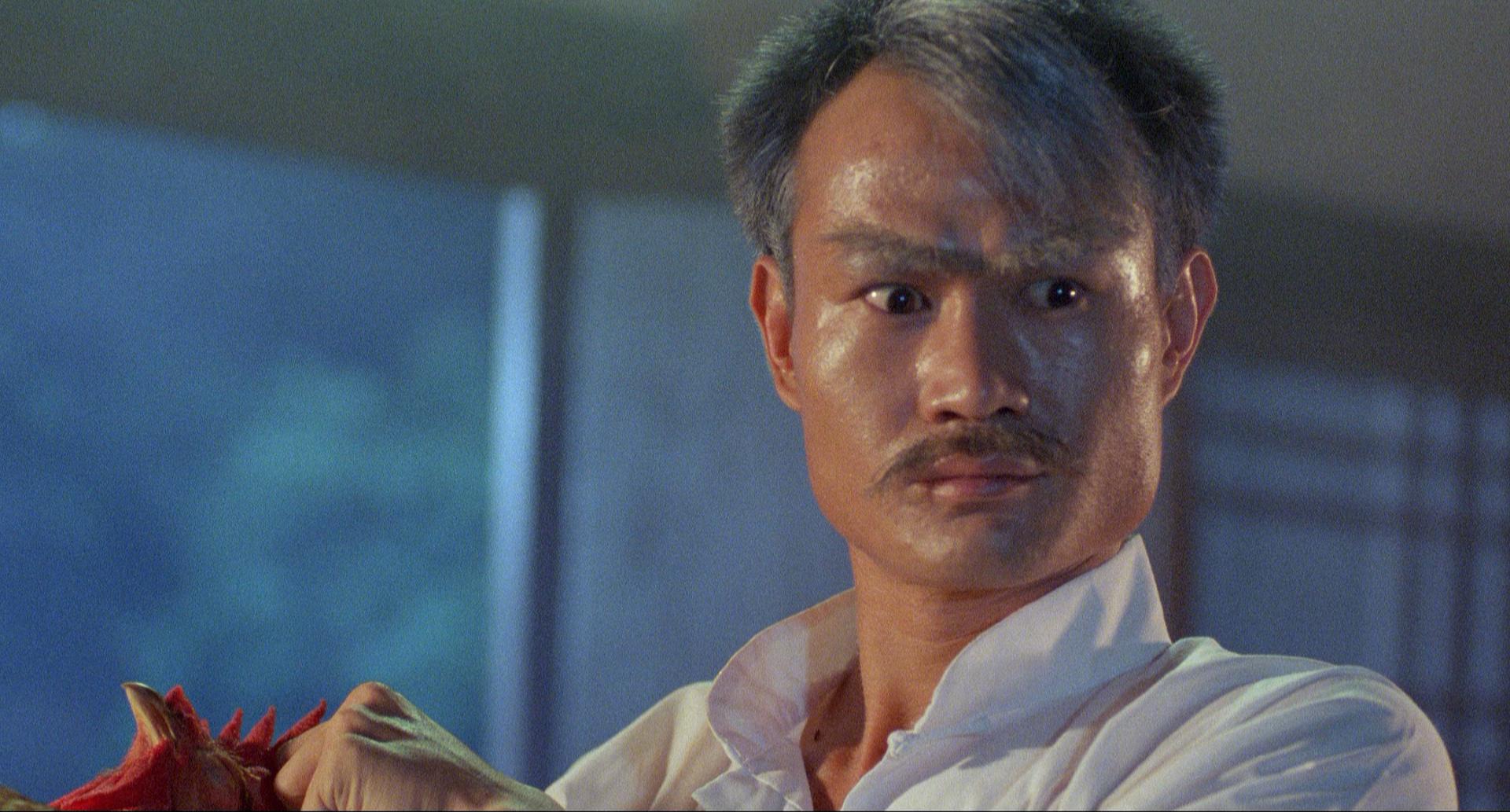Hopping Mad
‘Mr. Vampire’ is one of the most enduringly popular of Hong Kong films, still winning fans over more than a decade after its original release. This applies in Britain as well, thanks almost entirely to Channel 4’s screening as part of its ‘Chinese Ghost Stories’ season. Less well known are the myriad of sequels it inspired which have yet to appear on our shores; plus countless spin-offs on a similar theme.
There are two common elements in most of these films: Ricky Lau as the director, and Lam Ching-Ying as the star. The original movie made Lau’s name, and he has since wasted no opportunity to cash in, with three direct sequels as well as other films with titles like ‘Ultimate Vampire’ and (appalling pun alert!) ‘The Vampire Strikes Back’. He’s also directed more straightforward action pics, though the titles of even these seem to resound with supernatural overtones – ‘Nocturnal Demon’ is actually a straightforward serial killer film. Lau plays to his strengths admirably in the ‘Mr. Vampire’ series, with a restrained use of special effects; the films are firmly rooted in a real world, even if not quite this one. Stunts and action, naturally, play a big part in the series, but they’re never allowed to overshadow the characters, who are far less two-dimensional than in most of their Western genre counterparts. Even in the sequels, while many would happily to ride the same tracks again, Lau pushes the envelope, twisting and modifying the genre further, changing locations and era at will.
Lam Ching-Ying has a long and honourable career, going right back to perhaps the original horror-comedy, ‘Close Encounters of the Spooky Kind’ – even before that, he was a noted stuntman, appearing in ‘Enter the Dragon’ as the main double for Han in the ‘hall of mirrors’ end fight. He’s especially noteworthy for an exceptional screen presence, in his perpetual role as “sifu”, or master. When things go wrong – as they inevitably do – it’s only his knowledge of folklore and legend that save the day, especially when the films are set in the modern day. When this is the case, his major problem is often not the vampires, it’s trying to convince other people to take them seriously. The audience doesn’t have this problem, since Lam Ching Ying projects such a resounding air of authority that whatever he says must be right. Unfortunately, this competence did not extend to his directorial debut, a remake of “The Green Hornet”, which set new record lows at the Hong Kong box-office.
Apart from these two, many other performers who appeared in the first movie returned later in the series: Wu Ma (part 4), Pauline Wong (part 2), Billy Lau (part 3), and even Moon Lee, who appears in both of the first two entries. Though you’d be hard pushed to recognise her, especially in the original film, since it was before the “eye-widening” cosmetic surgery which left her with that trademark and highly distinctive wide-eyed look, like something out of ‘Project A-ko’! You can also spot Sibelle Hu, Yuen Biao and Samo Hung, making the series something of a Golden Harvest All-Stars production.
It’s important to be relaxed about the rules of engagement depicted in these movies, because we’re dealing with something totally unfamiliar. Everyone knows to use garlic & crucifix if dealing with Western vampires, but for their Oriental “blood brothers”, a new set of rules are in play. Some examples:
- a) Vampires can’t see you if you hold your breath…
- b) …or are covered in tar.
- c) If “infected” by a vampire you need blood from it to cure you…
- d) …or maybe sticky rice.
- e) You know someone is possesed if their heels don’t touch the ground.
Ok, fine. Of course, there are some similarities. Vampire corpses don’t decay, their bite will turn you into one, and if anything is attached to them — such as stakes or magic spells –removing them generally rates low on the IQ scale. Not that this stops most of the characters in the Mr. Vampire series, which shows another point of similarity between East and West – regardless of location, participants in all horror movies are inevitably cerebrally challenged!

Mr. Vampire – Lam Ching-Ying, Ricky Hui, Moon Lee, Chin Siu Ho, 1985. This first entry remains a landmark in the genre, and introduces many of the ingredients that recur repeatedly in the series: well-intentioned but bungling assistants, femme fatale spirits, lots of fun poked at authority figures (though I’m not claiming any subtle political subtexts!), and the inevitable “Lock the door and don’t open it whatever happens” gag. Lam is a ‘spiritual advisor’, whose attempts to rebury a corpse go horribly wrong when it turns out to be a vampire. His knowledge lands him in hot water with the constabulary, who suspect him of the murders it commits, and he has to handle both them, and his two assistants, one of whom has been bitten, and the other of whom is trysting with a beautiful lady ghost. The amount of invention on view is impressive, with subplots spiralling away in all directions, though the whole fits together beautifully. Major silliness: lady ghost, with head which can detach itself, grow hedgehog-like hair, and attack independently of her body. B+
Mr. Vampire 2 – Lam Ching-Ying, Yuen Biao, Pauline Wong, Wu Ma, Sibelle Hu, 1985. After the historical stance of the first film, it’s something of a shock to discover the sequel is firmly rooted in the present day. It starts with grave-robbers stealing a “family” of corpses, but before long, the vampire kid has escaped, taking up with a local family. This subplot is strangely reminiscent of ‘ET’, a similarity which is invoked during the inevitable song while the vampire and human kids play together: “You’re ugly but your heart is not. They take you for an E.T.”; fortunately, the child actors are not too unbearable, making it sweet rather than sickly. Meanwhile, mummy and daddy blood-sucker are looking for their son, and Lam Ching Ying turns up as a pharmacist, called in to treat a vampire bite, who realises something is going on. In what has to be an all-time classic euphemism, he isn’t going to kill the vampires, but “help them to an early and successful reincarnation”. Bet they’ll be chuffed. At time of writing rumours suggest this may be shown as part of an imminent second C4 season, so keep an eye out for it (knowing TC schedules, it’s probably already been on by now…). Major silliness: slow-motion fight sequence after vampires and grave-robbers are accidentally dosed with sedative. B
Mr. Vampire 3 – Lam Ching-Ying, Billy Lau, Richard Ng, Lui Fong, 1987. Back in time again, though it’s not immediately obvious for the first 15 minutes. Here, the central character is a Taoist priest who’s got a nice exorcism extortion scam going, thanks to a pair of accomplice spirits who haunt places at his behest, until he exorcises them. Life is fine until he meets honest Taoist Lam Ching Ying who captures the spirits in jars; and adds them to a mega-collection. Their human friend releases them, but also accidentally frees a less amenable female ghost. In fact, the words “seriously” and “pissed-off” come to mind. This is my least favourite of the films; it fails to provide any new angles or approach; there’s not much here that wasn’t seen in part one. While Lam Ching Ying is his usual forceful self, the other “hero” just can’t quite cut the mustard, being neither interesting nor amusing. It all gets terribly manic, needless to say, but it’s just smoke and no fire, which not even a cameo by producer Samo Hung can save. Major silliness: possession by invisible spirit leads to bout of self-wrestling. D-

Mr. Vampire 4 – Wu Ma, Anthony Chan, Yuen Wah, Chin Kar Lok, Loretta Lee, 1987. Shock! Horror! Probe! No Lam Ching Ying! He was presumably too busy working on one or other of the many Mr Vampire clones in which he appeared, so we get another actor with enormous eyebrows, Wu Ma (anyone know if they’re real, or stunt doubles?). The set-up continues to vary; from the previous entries’ urban setting, we’re now out in the country, with two neighbouring priests, one Buddhist, one Taoist, and their acolytes. The first half of the movie is devoted to their bickering and perpetual attempts to make the other look foolish, which is amusing, although scarcely anything to do with vampires. Things perk up notably in this department later on, when a passing funeral procession spills an especially unpleasant example of the genre. We’re then treated to a spectacular display of physical comedy which, for me at least, makes this the most purely enjoyable of the series. While the ending is a slight cop-out, as far as methods of killing the unkillable goes, this doesn’t detract much from a thoroughly entertaining ninety minutes. Major silliness: a conga-chain of limbo-dancing hopping vampires. A-
After this, the series went into something of a decline, and neither ‘Mr Vampire 1992’, nor ‘New Mr Vampire’, did anything new or remotely interesting. There is, however, one further entry in the genre worthy of comment. While not an official part of the canon, it has been listed on occasion as ‘Mr Vampire 5’ (though some claim ‘Mr Vampire 1992’ is a more likely contender for the title). Its release here, and overall high quality, mean it deserves some consideration:
Magic Cop (dir. Stephen Tung Wai) – Lam Ching-Ying, Wilson Lam, Miu Kiu-Wai, Michiko Nishiwaki, 1989. The film starts with a puzzling case where an arrested criminal is found to have died some time before being arrested. With Mulder and Scully presumably unavailable, Lam Ching Ying, a cop and part-time exorcist from the provinces, is brought to the big city to investigate. After initial disbelief from his partners – rapidly changed after an encounter in a mortuary – he discovers that corpses are being re-animated by sorceress Nishiwaki to act as minions in her crime empire. Viewers may be reminded of ‘Dead Heat’, which took a similar line – though Western policemen had much more trouble coming to terms with the concepts! Nishiwaki delivers another excellent supporting performance (as ‘God of Gamblers’ and ‘Twinkle, Twinkle Lucky Stars’ showed, she can steal a movie with one scene, and she gets a little more here) and provides a fine foil for Lam, who also helped out as action director. Director Tung Wai had himself graduated from that role on ‘A Better Tomorrow’, so it’s no surprise this is perhaps the most effects-laden entry, especially in a spectacular final battle. Sadly, the version released in this country features some of the most illegible subtitles ever seen, destroying the atmosphere somewhat. Major silliness: magical battle between hero and villainess, using a rather confused cop as an intermediary. B
Lam Ching-Ying Selected Filmography
The following is a list of some of the most important or entertaining entries in Lam Ching-Ying’s long career (a full filmography would be at least twice as long!). Titles in bold are believed to be currently available in this country…somewhere.
- 1980 – Close Encounters of the Spooky Kind
- 1982 – The Dead and the Deadly
First Mission (cameo)
Prodigal Son
Winners and Sinners - 1985 – Heroes Shed No Tears
Mr. Vampire
Mr. Vampire 2
My Lucky Stars
Twinkle Twinkle Lucky Stars - 1986 – Eastern Condors
Shanghai Express - 1987 – Mr. Vampire 3
| Ultimate Vampire - 1988 – I Love Maria (aka Roboforce)
Last Eunuch in China
Painted Faces
School on Fire - 1989 – Close Encounters of the Spooky Kind 2
Magic Cop (+ action dir.)
Pedicab Driver - 1990 – Swordsman
- 1991 – Crazy Safari
Lover’s Tear (+action dir.)
Red and Black
Slickers vs. Killers - 1992 – Forced Nightmare
Martial Arts Master Wong Fei Hung
Mr. Vampire 1992
Pom Pom + Hot Hot (UK title: Curry & Pepper) - 1994 – The Chinese Ghostbuster
The Green Hornet (+dir/prod)

